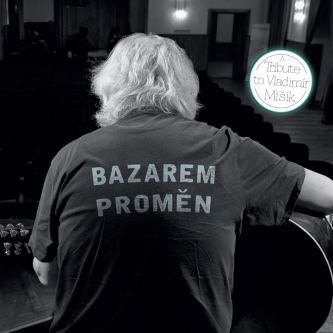
Not only a number of rock musicians grew up with Vladimír Mišík’s songs, but also these hits are the foundation for party songbooks of several generations. Stříhali dohola malého chlapečka, Variace na renesanční téma, 20 deka duše, Slunečný hrob… is just a fraction of songs from the archives of Vladimír Mišík, and they are known to everybody. The publishing house Indie Scope has decided to pay homage to the rock legend by recording and releasing the album Bazarem proměn: A Tribute to Vladimír Mišík. The publishing house addressed various musicians of the Czech and Slovak independent music scene and asked them to choose a song which they preferred from the rich discography of Vladimír Mišík and to record a cover of this song.
On the resulting recording there will eventually appear 22 songs recorded by e.g. Jan P. Muchow, Ille, Jan Spálený & ASPM, Tara Fuki, Mňága & Žďorp, ZVA 12-28 Band, Lesní zvěř, Ladě, Bratři Orffové, Kieslowski, Boris Carloff, Květy and many others. The work of Vladimír Mišík has great respect among musicians; this way he has been described by the singer and poet Michael Kubesa from the band Ladě: “Mišík’s work has spoken to me with everything what is work of an individual possible to share with others. The music opened the gate of heart and unconsciousness. Feelings, secret desires and pain have merged together and there it was the intensive intervention of lyrics. One had the impression that he could perceive and feel by everything he had and sometimes even by what he didn’t have. I can’t ignore the fact that Vladimír Mišík and the people around him have always been role models for me. I fully trusted them even though I didn’t know them. They shaped me. To this day I have been carrying within this sweet curse. I can’t accept the work of an artist when I know that I can’t appreciate him as a person.“ This approach to the work and personality of Vladimír Mišík is shared by most of the musicians involved in this project. The title of the compilation Bazarem proměn/Through the Bazaar of Changes (named after one song) symbolically refers to the transformation of well-known original versions of songs which occurred during the creative process.
The resulting compilation Bazarem proměn: A Tribute to Vladimír Mišík shows diversity not only in independent music scene, but also the disparity in approach with which the new artists worked with the original. And so the album combines electronics with singer-songwriter tenderness, keeping the atmosphere of the time of origin of the original song confronted with contemporary remixed cover of the song. Some of the participants were hanging on to original versions, on the other hand, many of them kept only fragments or main tunes from the original. Each musician had their own approach, as Martin E. Kyšperský (Květy) shows: “Me and Aleš Pilgr, the drummer from Květy, really like the album Etc...4, which is quite underrated. Partly because of the strange sound of electric drums but we think it is amazing and today, surprisingly enough, even modern! And in those songs there’s the spirit of the time, so we made the song Návštěvní den, but there are pieces of lyrics of all other songs on that album.“
Who is Vladimír Mišík?
He is one of the most outstanding personalities of the Czech popular music since the 60s of the 20th century. With his work, he has influenced many artists, whether in musical, art or literary environment. Under the brand ETC, the musicians have started performing already in 1974. Vladimír Mišík with the band ETC, through many personnel changes and a two-year ban in the 80s, has been playing at concerts until today. Until 2007, Vladimír Mišík & ETC…released 10 studio albums and several other compilations.
The entire album is mostly a tribute to Vladimír Mišík, who is so original that it is really hard to try to reach his level. “I have always been surprised by the unusually beautiful lyrics in connection with his music and especially his voice which is kind of biting and caressing at the same time.“ We can’t but agree with Jiří Hradil (Lesní zvěř) who further says: “He managed to survive socialism and remain an honest man. His music is free.”